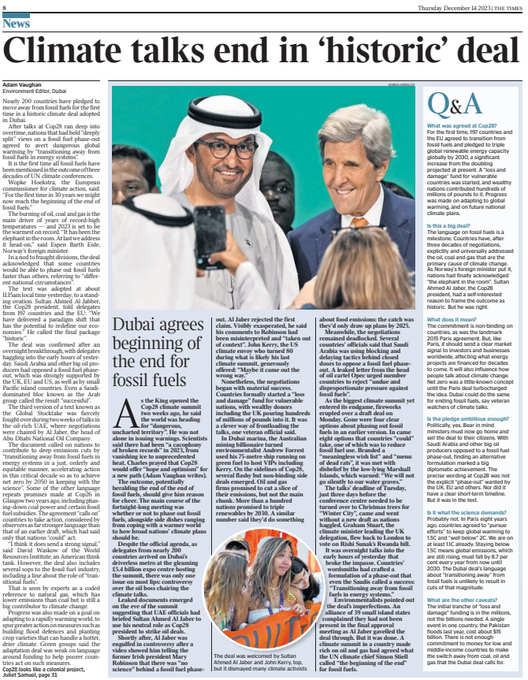Hope in dark times is no match for action, but becomes a hindrance.
Wolfgang Knorr is a climate scientist, consultant for the European Space Agency and guest researcher at the Department of Geography and Ecosystem Science, Lund Universit
For the keen observer, there are currently two crash scenarios unfolding. One at a speed that allows it to be observed in real time, the other in such slow motion making it largely invisible. And in both cases, one of the main factors accelerating the crash is denial driven by the fear of defeat.
The first crash is unfolding in Ukraine, which has manoeuvred itself into an impossible situation. Most of Western military aid has been spent on its failed spring offensive, funding from the US is all but drying up due to public war fatigue, while its second most important funder, Germany, has pledged to increasing domestic spending cuts for more military aid to come – a recipe for political disaster, given how unpopular Ukraine aid has become. To come is a looming Russian backlash, wiping out miniscule territorial gains paid for with the lives of tens of thousands of its soldiers.
At the heart of this unfolding disaster is the denial of the power imbalance between Ukraine and Russia, coupled with a fear of being stuck with defeat. Hence the maximalist goals of regaining all the annexed territories, including Crimea, cheered on by mainstream Western media, who believed that they could speed Ukraine to victory by the sheer power of hopeful messages. If instead Ukraine had accepted partial defeat and fortified its defences to prevent any further Russian advances, it would now be in a reasonably strong negotiating position. It’s a textbook example of how fear of failing leads to denial and eventually defeat.
Something very similar was tangible recently at the climate negotiations in Dubai, called COP28, that just ended. While this year, global mean temperatures briefly reached two degrees above industrial levels, conversations at COP28 were still clinging on to the goal of limiting global mean temperature to 1.5 degrees, a goal few of the public still believe in. So 1.5 has become the equivalent of retaking Crimea. It only exists in dreamland, and evoking its image serves to dispel any sense of defeat.
The result of the denial are again miniscule gains – like pledges to a loss and damage fund dwarfed by the earnings of top footballers – that are more than wiped out by further rising emissions of greenhouse gases and the enduing disasters they bring with them. Rising emissions that overwhelm the very climate process like the flood of Russian soldiers and tanks, only that the army has been sent by ourselves. What we do not want to see is the power imbalance between activism and the sheer inertia of business as usual. Apart from the miniscule pledges, all we have got are vague and meaningless declarations that at a closer look – according to this analysis by leading academics – are a step backwards.
There is an uncomfortable question here that we all need to answer: how much do we actually care about the climate crisis? Why would negotiators and activists at COP28 invoke such impossible optimism to dispel a sense of defeat? A possible answer: It is not climate chaos that is feared most, but a sense of personal failure, a feeling of impending doom and the powerlessness that comes with having been defeated. In a subtle twist of the original meaning of “there is nothing to fear but fear itself”, we do not actually care so much about the climate, but more about our own psychic health. And these fears can be about losing one’s job, appearing to be ineffective, or about letting go of a planet that once was. Seen that way, our fears become the true barrier to action, and the climate negotiations a dance around finding the best way to allay them.
This is an explanation based on the personal, but there is also a collective, societal one. In our culture, hope is considered such a high good, that the thought it could be detrimental is impossible to express. The common framing is that hope is always good, and that those who engage in despair are bad. In this essay, Rebecca Solnit’s charge against defeatists is that they pretend to know, and have the answers. But there is also a flip-side, that those engaging in impossible hope act as if they knew the answer, while actually not believing in what they do. But admitting defeat is not about knowing the answer, it is about surrendering to the fact that you don’t.
Hope has not always had an immutably positive reputation, though. The ancient Greeks saw hope as “a dangerous comforter”, and Hannah Arendt, who had studied ancient Greek thought, saw it as “a dangerous barrier to acting courageously”, noting how hope had been used extensively by the Nazis to soften opposition by the German educated classes and Jews alike. If we want to escape the cycle of self-defeating promises coupled with hidden fears, we need to be the ones to start defeating what holds us back, no matter what the chances are of eventual success. We need to acknowledge the mechanism of denial, sit with the pain caused by admitting it, and then clear the way for looking at the real issue, which is impending death and destruction at the hands of the same business as usual mindset that we take part in.
Wolfgang Knorr
I support Brave New Europe because global crises urgently require reporting free of corporate and government ideology.
Donate: https://braveneweurope.com/donate




Brilliant, thanks Wolfgang! It really helps explain folks’s fear of being left with despairing feelings if they really accept the magnitude and reality of our situation. It’s the elephant in the room that needs addressing if we’re ever to progressively talk about our predicament,